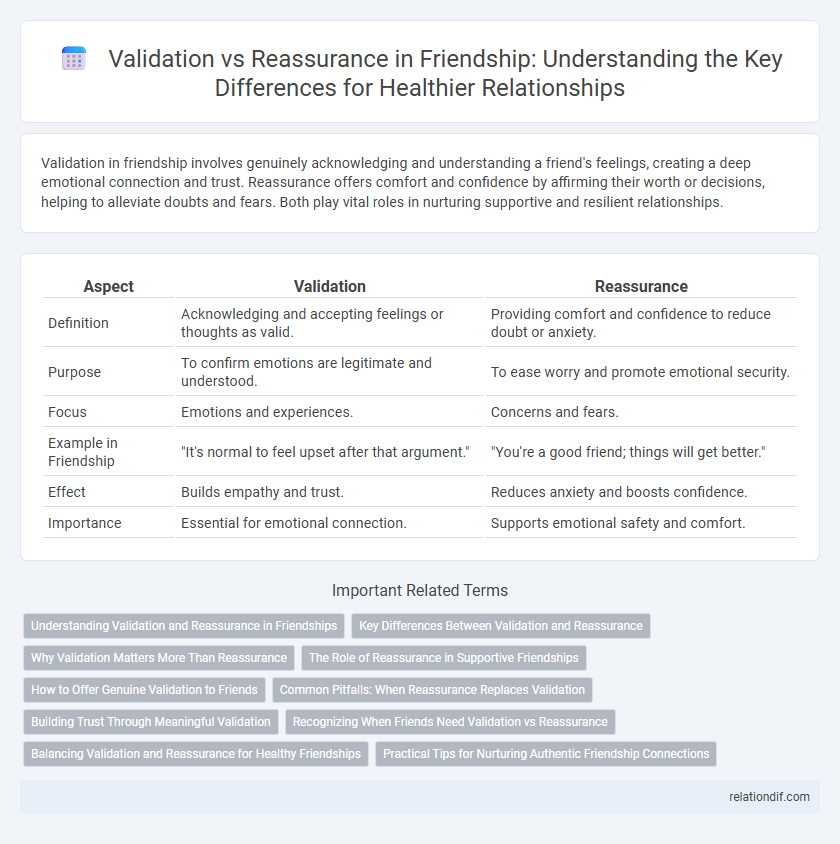Validation in friendship involves genuinely acknowledging and understanding a friend's feelings, creating a deep emotional connection and trust. Reassurance offers comfort and confidence by affirming their worth or decisions, helping to alleviate doubts and fears. Both play vital roles in nurturing supportive and resilient relationships.
Table of Comparison
| Aspect | Validation | Reassurance |
|---|---|---|
| Definition | Acknowledging and accepting feelings or thoughts as valid. | Providing comfort and confidence to reduce doubt or anxiety. |
| Purpose | To confirm emotions are legitimate and understood. | To ease worry and promote emotional security. |
| Focus | Emotions and experiences. | Concerns and fears. |
| Example in Friendship | "It's normal to feel upset after that argument." | "You're a good friend; things will get better." |
| Effect | Builds empathy and trust. | Reduces anxiety and boosts confidence. |
| Importance | Essential for emotional connection. | Supports emotional safety and comfort. |
Understanding Validation and Reassurance in Friendships
Validation in friendships involves recognizing and affirming a friend's feelings and experiences, fostering emotional safety and trust. Reassurance provides comfort and support by alleviating doubts or fears, strengthening the bond between friends. Understanding the balance between validation and reassurance helps maintain healthy, empathetic relationships that nurture mutual respect and connection.
Key Differences Between Validation and Reassurance
Validation acknowledges and accepts a friend's feelings as genuine without judgment, fostering emotional understanding and connection. Reassurance offers comfort by alleviating doubts or fears, often providing positive affirmations to reduce anxiety. The key difference lies in validation affirming emotions as real, while reassurance seeks to soothe and encourage confidence.
Why Validation Matters More Than Reassurance
Validation matters more than reassurance in friendships because it acknowledges and respects a person's feelings, fostering deeper emotional trust and connection. While reassurance may temporarily ease doubts, validation empowers individuals by affirming their experiences as real and significant. This authentic recognition strengthens bonds and promotes genuine understanding between friends.
The Role of Reassurance in Supportive Friendships
Reassurance in supportive friendships strengthens emotional security by affirming a friend's feelings and experiences, fostering trust and deeper connection. Unlike validation, which acknowledges the truth of emotions, reassurance provides comfort and hope during challenging moments. This dynamic enhances resilience, encouraging open communication and sustained mutual support.
How to Offer Genuine Validation to Friends
Offering genuine validation to friends involves actively listening to their feelings without judgment and acknowledging their emotions as real and important. Use empathetic language that mirrors their experience, such as saying, "I can see why you feel that way," rather than offering quick fixes or reassurance phrases like "You'll be fine." Creating a safe space where friends feel heard and understood strengthens trust and deepens the connection.
Common Pitfalls: When Reassurance Replaces Validation
Relying solely on reassurance in friendship often leads to ignoring the underlying emotions that require validation, causing feelings of dismissal or misunderstanding. Common pitfalls include minimizing a friend's experience by offering quick fixes or platitudes instead of acknowledging their feelings authentically. Effective support balances empathetic validation with reassurance to foster trust and deeper emotional connection.
Building Trust Through Meaningful Validation
Meaningful validation in friendship involves genuinely acknowledging and understanding a friend's feelings, which fosters deeper emotional connection and trust. Unlike superficial reassurance, validation affirms experiences and encourages authenticity, strengthening the relational bond. Consistent validation builds a foundation of trust, making friends feel valued and secure in expressing their true selves.
Recognizing When Friends Need Validation vs Reassurance
Recognizing when friends need validation versus reassurance involves understanding their emotional cues and the context of their concerns. Validation acknowledges their feelings as legitimate and important, helping friends feel seen and heard, while reassurance offers comfort by alleviating fears or doubts. Paying attention to whether a friend seeks empathy or support in overcoming challenges ensures appropriate and meaningful responses.
Balancing Validation and Reassurance for Healthy Friendships
Balancing validation and reassurance is essential for healthy friendships, as validation affirms feelings and experiences, fostering trust and emotional safety. Reassurance provides comfort and support during moments of doubt or anxiety, promoting resilience and strengthening the bond. Maintaining this balance helps friends feel understood and valued without dependency, ensuring mutual respect and growth in the relationship.
Practical Tips for Nurturing Authentic Friendship Connections
Authentic friendship thrives on validation, as it acknowledges feelings and experiences, fostering deeper trust and emotional safety. Practical tips include active listening without judgment, expressing empathy by reflecting your friend's emotions, and affirming their worth through sincere compliments. Reassurance complements validation by offering support during uncertainty, but prioritizing genuine acknowledgment builds a stronger, more resilient connection.
validation vs reassurance Infographic

 relationdif.com
relationdif.com